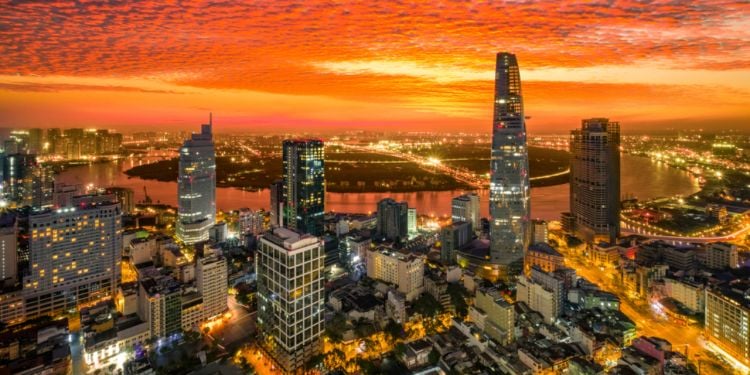
Anyone thinking about working in Vietnam is in for a treat. Compared to many Western countries, Vietnam's workforce operates in accordance with an entirely different range of customs and traditions. We have compiled the most recent information on the Vietnamese job market to familiarize you with the job-hunting process.
Vietnam's economy
Vietnam's economy has been booming over the past decade. In 2024, Vietnam's GDP surpassed expectations, reaching 7.09% versus the 6.5% growth target. Numerous industries are skyrocketing, which in turn is creating numerous opportunities for foreigners and residents.
Working in Vietnam offers a unique and intriguing professional life with competitive salaries, and perks ranging from a housing allowance to regular team-building dinners, and quarterly retreats. These events will give you the opportunity to socialize with your team and get to explore Vietnam with new friends.
Without further ado, let's take a brief look at what kinds of jobs are available in Vietnam.
Vietnam's job market
As of 2024, the unemployment rate in Vietnam is incredibly low, sitting at 2.24%, especially compared to other countries in the region. The majority of Vietnamese people living in the countryside work in the agricultural sector. This is hardly a surprise as it accounts for nearly 15% of the country's Gross Domestic Product (GDP). The service sector is also huge in Vietnam. However, since exports account for the majority of this country's economy, the various manufacturing industries also provide ample employment for locals.
Companies in Vietnam are fiercely competitive when it comes to bringing foreign expertise into their ranks. Therefore, generous relocation packages are normally offered to prospective employees. The lucrativeness of these packages will depend on several variables, including age, experience, and your ability to negotiate. It would be unfair to say that older applicants are treated with more respect. However, the social hierarchy in Vietnam generally implies privilege for the mature in both professional and home life.
Any foreign professional under the age of 25 who is considering working in Vietnam will be presented with numerous options, but applicants moving abroad with families should ask that their offer letters be tailored toward benefits with the school system.
Teaching
Vietnam has several routes to teaching as a career. Requirements, however, have become stricter in the last two years, and it is impossible to be granted a work permit without a bachelor's degree. Many international schools are now also looking for candidates whose degree matches the field in which they would prefer to teach.
With an international school, you receive the benefits of a set schedule, a global curriculum, and signing perks that range from housing allowance to continuing education benefits. With language centers like ILA or YOLA education, the requirements may not be as strict, but you will still require previous experience and a bachelor's degree.
While teaching English in Vietnam was previously regarded as an easier route to employment, with the many changes and adjustments to visa policies, you might need to research where you are best suited as a candidate before applying. We encourage you to line this work up before arriving in the country to avoid unnecessary delays with your contract and housing.
Information technology
The IT sector in Vietnam presents an abundance of opportunities for new and creative professionals in this field. The most popular occupations include web development, graphic design, and software engineering. Whilst Vietnamese companies hire foreign experts, be prepared to adjust your vision of the Vietnamese labor market. Leo Burnett, Shoppee, and Deloitte are just a few of the international companies currently with job openings in Vietnam. You can also use LinkedIn and Glassdoor for more listings.
Social media influencer
With today's technology trends, companies are contracting social media influencers to help develop brand reach and identity. If you already have a travel blog or an online presence, you can apply to companies like TikTok or Momo, a Vietnamese banking app, and work with their branding team on a contract basis. However, because it falls under freelance or entrepreneurship, this route cannot guarantee a work permit, and it would technically be illegal to continue under a tourist visa in the long term.
If you are serious about building an audience in Vietnam, you will definitely need to learn Vietnamese. Gaining the trust and admiration of the local younger generation is the first step to shooting into influencer fame.
How to find a job in Vietnam
Working in Vietnam is relatively easy, given the ubiquity of resources available. Furthermore, most of them are online or at least have a web-based counterpart.
Recruitment agencies and job portals in Vietnam have a clear and accessible online presence. What's more, LinkedIn and Facebook are frequently used by employers from numerous sectors.
If you're serious about working in Vietnam, the best way of making sure everything is above board is to start networking on LinkedIn or review company Glassdoor profiles.
Applying for a job in Vietnam
Ensure your CV is up to date and tailor every cover letter with skills found in the job description. Depending on your industry, the preliminary interview will be with the hiring manager. International schools or larger companies may have a recruitment department that will manage the first interviews conducted via Zoom or in person.
We encourage you to arrive at least five minutes before the interview and dress to impress. At the end of the interview, you are encouraged to ask about the hiring timelines, and you can push to know when a decision will be reached. Discussions on salary or negotiations will be kept until the day of offering the job.
Your timing will also be fundamental to success in many fields, as employment is sometimes seasonal. Teaching English is a classic example of this fact, as schools and universities are subject to holidays. That being said, opportunities to work privately exist in abundance as Vietnam's middle class continues to grow. While the opportunities are available, finding a way to connect with these families proves difficult without a strong networking system.
Working conditions in Vietnam
By law, you are required to work up to 48 hours in Vietnam. But this doesn't mean you will be working all of the mentioned time. Teachers, for example, may be contracted out to different schools and centers across multiple districts. This can bring in a different level of excitement as you get to travel across the city during your working hours. On average, a standard work day in Vietnam goes from 8 am to 5 pm with a lunch break. Depending on whether you work for a language center or an international school, you may be required to do evening shifts or a little overtime over weekends. If possible, try to talk to current or past employees to get a clear picture of expectations and management.
You are allowed to perform extra hours for which you will be entitled to additional remuneration. Those working at night are paid 30% extra. You are allowed to carry up to a maximum of 200 overtime hours per year.
You will be entitled to a minimum of 12 days paid leave per year and 9 public holidays. If you are curious about parental leave or any other kind of time off, you are encouraged to ask during the interview or make an appointment with your HR department after accepting the job offer. Vietnamese citizens adhere to paternity leave of 5-14 days, and for Vietnamese mothers, six months of maternity leave is available to start before the birth.
Types of work contracts in Vietnam
Employment contracts in Vietnam generally state the employee's salary, the place of work and working hours, professional duties to be carried out, and social insurance.
Labor law in Vietnam recognizes three types of contractual work:
- Permanent employment contracts: An indefinite-term labor contract in which the employee must pass a successful probation period that ranges from 1- 3 months.
- Fixed-term employment contracts: On average, they last 12 to 36 months, and the employee may not have a renewed contract or work permit authorization after.
- Seasonal employment contracts: On average, they are less than 12 months and refer to specific jobs available at certain times of the year.
Working culture and etiquette in Vietnam
Vietnamese people are incredibly dynamic and hardworking, and in many respects, working in Vietnam is similar to the working cultures of nearby countries like China and Japan. A solid work ethic is the backbone of this country's rising economy. Offices are considered a very formal environment in Vietnam, and feng shui plays a small part in their working culture. As an expat, you would, of course, be expected to dress in appropriate attire. However, you can take several other actions to ensure you create a memorable and terrific first impression:
Go to lunch - Vietnamese workers love socializing over lunch and after-hours drinks. This is one of the best opportunities you will have to expand your professional network and make new friends.
Keep your head above water - Vietnam is a Buddhist nation. Therefore, the head is considered the most sacred part of the body. Do not touch a person's head, as this is considered very disrespectful. This applies to all circumstances, not only in the workplace. Also, Vietnamese people don't like to display confusion or “lose face” in front of others. Remember, maintaining a calm temperament will be the most helpful way to approach any discussion or problem.
Punctuality and public decorum - Arrive on time for any meetings and don't cause public conflict between colleagues or friends. Vietnamese people will not tolerate a public disagreement, and you will instantly feel the conversation or business negotiations stall. This also includes using sarcasm for humor, which may get lost in translation.
Be respectful - Company hierarchy in Vietnam is relatively straightforward. For the majority of circumstances, the likelihood is that older people are closer to the top of a company's workforce structure. Thus, it is prudent to behave in an appropriate manner. Vietnam is becoming more liberal in equal opportunities for genders. Ensure that you are polite and kind to all colleagues.
Legalities and work permits in Vietnam
Although acquiring a work permit in Vietnam is a lengthy and complex process, updates happen frequently. The most recent changes took place in August 2023, making the process stricter. There are more requirements for proof of education and previous experience.
The process of obtaining a work permit in Vietnam, if you have already met all the educational requirements, is simple. Your employer will send you an invitation to work or a contract, which you will take to your embassy for notarization. If you are outside of Vietnam, the company's HR department will guide you through the steps to ensure everything is legal. If you are already in Vietnam and starting a new position, you may take up the challenge of getting a police check and medical check to assist with your work permit process.
Important:
All documents must be translated into Vietnamese and notarized.
Bringing your family to Vietnam
It is possible to travel with your whole family to Vietnam, including spouses, children, and pets. The best way to proceed is to ask your employer for guidance or to bring it up early in the interview stage so it can be worked into your formal contract.
A future employer can assist with recommending the best school for your children and, depending on your contract, will help with accommodation. A few contracts will include housing, but none will include free education. Prior to moving to Vietnam, your best bet will be to join Facebook groups to understand neighborhoods and districts and grasp your future landscape. Facebook groups that are useful include Fexpats - HCMC and Hanoi Expats.
There is a large expat community in both these cities. You can find other families with young children, other dog or cat lovers, and places to pursue new and exciting hobbies. Each member of your family can live a deep and meaningful life by moving to Vietnam.
Useful links:
We do our best to provide accurate and up to date information. However, if you have noticed any inaccuracies in this article, please let us know in the comments section below.












Comments
2